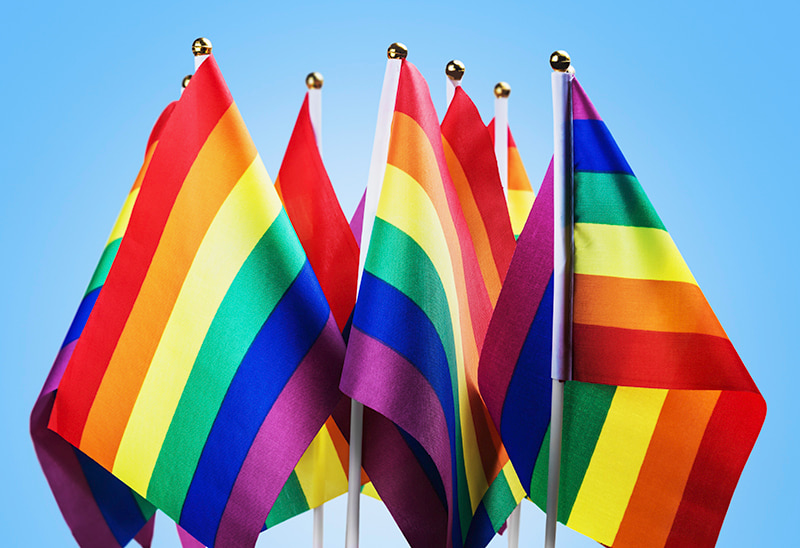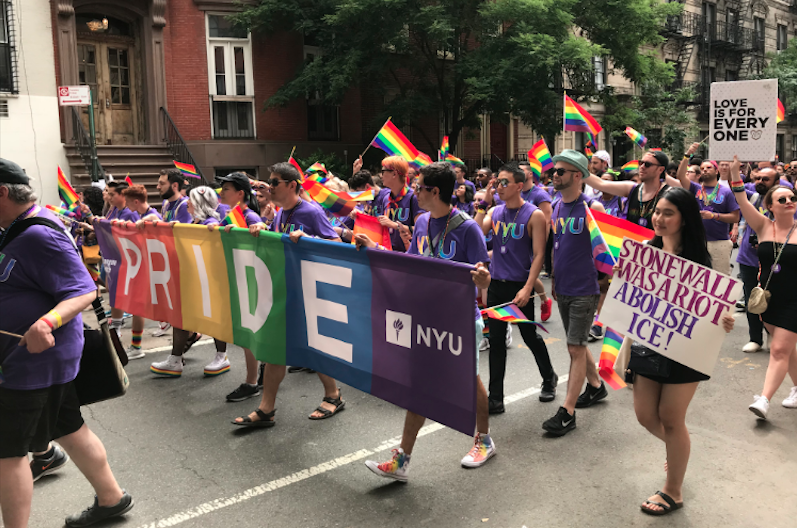LGBTQ advocates alarmed at Trump’s religious exemption for health care workers
HHS issues rule allowing health care workers with socially conservative religious views to refuse to provide certain treatments

To coincide with the National Day of Prayer, President Trump announced the issuance of a finalized rule from the Department of Health and Human Services that allows health care workers who have religious objections to certain medical procedures to refuse to provide or assist in providing that care.
The rule, explained in a 440-page document that provides examples of the types of religious exemptions available under the law, defines and redefines key terms such as discrimination, referrals, and what it means to “assist” in a procedure.
For example, “discrimination” as outlined by the rule and its examples refers to refusal to hire or promote, or deciding to fire a health care professional (of any type), or the refusal to grant staff or hospital privileges, to individuals who refuse to assist in or perform procedures in conflict with their personal religious beliefs. It could also include “attempted coercion” of people who request exemptions from participating in procedures because of their religious beliefs.
According to HHS, the rule is necessary to ensure that health care workers with sincerely-held religious beliefs remain in the job. The rule explains that many health care professionals complained during the public comment period about “discrimination” or coercion on the job, with 25 comments from medical students who claimed they were considering leaving the field of medicine, and at least 90 medical professionals saying that, if forced to choose between employment or violating their consciences, they would quit their jobs.
“Ten of thousands of comments to the 2009 proposed rule expressed concern that, without robust enforcement of Federal conscience and anti‐discrimination laws, individuals with conscientious objections simply would not enter the health care field, or would leave the profession, and hospitals would shut down, contributing to the shortage of health care providers or affecting the quality of care provided,” the rule reads. “Thousands also feared personnel with objections would be terminated or otherwise unable to find employment, training, or opportunities to advance in their fields.”
The HHS rules explicitly mentions abortion, sterilization, assisted suicide and advance directives in the examples it provides as times when a health care professional’s religious conscience might come into conflict with what they are being asked to do. As such, it extends those protections to medical students, people who prep patients for operating rooms, charitable groups, and emergency medical technicians and paramedics.
With regard to what it means to “assist in the performance of” a procedure, the rule defines assistance as “tak[ing] an action that has a specific, reasonable, and articulable connection to furthering a procedure or a part of a health service program or research activity undertaken by or with another person or entity.”
As an example, a person required to schedule an abortion or preparing a room that might be used for an abortion would be allowed to request an exemption because such actions “are necessary parts of the process of providing an abortion, and it is reasonable to consider performing these actions as constituting ‘assistance.'” But a health care worker who objects to being scheduled to conduct physicals on patients at the same time that abortions are being scheduled for other, unrelated patients elsewhere in the building, could not claim they are being coerced into “assisting” in an abortion — so long as the objector is not being required to serve as the actual “backup doctor” for abortion-related services.
With regard to EMTs and paramedics, the rule would allow them to, for example, object to driving a person to a hospital for a scheduled abortion that has not yet been performed. Depending on the circumstances, they could also potentially object to transporting a patient with an ectopic pregnancy, which might require abortion services, although HHS notes: “as a general matter, the Department does not believe that mere speculation that an objected‐to service or procedure may occur suffices to establish a specific and reasonable connection between the objected‐to service or procedure and the act of transporting the patient.” But EMTs would not be granted the exemption in a case where a person is experiencing complications post-abortion, as such complications are “an unforeseen and unintended byproduct of a completed procedure.”

Roger Severino, the director of HHS’ Office of Civil Rights, who has long been an advocate of the religious exemptions, praised the final rule as a necessary measure amid a rising number of conscience-related complaints filed by health care professionals.
“Finally, laws prohibiting government funded discrimination against conscience and religious freedom will be enforced like every other civil rights law,” Severino said in a statement. “This rule ensures that healthcare entities and professionals won’t be bullied out of the health care field because they decline to participate in actions that violate their conscience, including the taking of human life. Protecting conscience and religious freedom not only fosters greater diversity in healthcare, it’s the law.”
While the HHS rule does not speak about treating LGBTQ patients, many civil rights advocates believe that the exemptions will not only be granted to health care workers who object to “assisting in the performance of” a gender confirmation surgery, but potentially will be interpreted by professionals and hospital administrators as allowing refusals to treat LGBTQ patients in general.
Proponents of the rule argue that it would not condone the denial of care to individuals in life-threatening emergencies. In the rule, HHS notes that: “With respect to EMTALA” — a 1986 federal law requiring hospitals and emergency rooms to provide at least basic stabilization services to patients, regardless of ability to pay — “the Department generally agrees…that the requirement under EMTALA that certain hospitals treat and stabilize patients who present in an emergency does not conflict with Federal conscience and anti‐discrimination laws.”
Still, LGBTQ advocates believe that broad interpretations of the rule will eventually lead to refusals to provide any type of medical care for a non-life-threatening condition to transgender people (even if unrelated to a gender transition), refusals to treat or transport gay, lesbian, or bisexual individuals for non-life-threatening medical conditions (even if unrelated to sexual health), and refusals to provide antiretroviral medicine to HIV-positive patients or PrEP to HIV-negative patients (under the guise that administering either medicine would constitute an “endorsement” of a sinful lifestyle).

Masen Davis, the CEO of Freedom for All Americans, noted that there have already been instances where LGBTQ people have been denied health care because of the objections of medical providers, including one in which a pediatrician refused to treat the newborn daughter of a Michigan lesbian couple because she objected to same-sex marriage.
“All medical patients should have the basic ability to seek care and treatment without the fear of being turned away or facing discrimination because of who they are,” Davis said in a statement. “This new HHS rule means LGBTQ people and others could be denied lifesaving emergency care or crucial information and counseling about their best health care options. A patient’s health should always come first, and all Americans should be treated fairly when attempting to care for themselves and their loved ones.”
“HHS’s final denial of care rule will substantially harm the health and well-being of many — in particular women and transgender patients,” Vanita Gupta, former head of the Justice Department’s Office of Civil Rights under the Obama administration and current president and CEO of The Leadership Conference on Civil and Human Rights.
“The government should protect all patients from discrimination, not make it easier for those in the health care system to discriminate,” Gupta added. “The rule is also arbitrary and capricious and exceeds the scope of the law it seeks to enforce. This rule must be scrapped.”
“Everyone deserves health care, especially the most marginalized who face barriers to access. Turning anyone away from health services is immoral,” the National LGBTQ Task Force said in a statement. “Despite their claims, the Trump administration’s rule will harm LGBTQ people. Discrimination is insidious, sometimes disguised as religion, which is why the National LGBTQ Task Force is working for full legal protections.”

But the Catholic Medical Association praised President Trump and HHS for pushing for the rule.
“The integrity of conscience is central to every human life, as has been affirmed by Saint Pope John Paul II, Pope Benedict XVI, and Pope Francis,” Dr. John Schirger, president of CMA, said in a statement. “This should of course apply to health care workers as well, and nothing short of protection of their conscience is acceptable. We are very grateful for this action having been taken.”
Dr. Marie Hilliard, the co-chair of CMA’s Ethics Committee, also weighed in, espousing what social conservatives see as the benefits of the new rule for people of faith.
“Without this protection, healthcare workers cannot be true advocates for our patients, especially if the best interest of the patient is being violated,” she said. “As Catholic healthcare professionals, we never abandon patients even if it means we must transfer their care if they are requesting a procedure that violates their well-being or our professional integrity. Thus, this final rule is very protective of not only professionals but of the human beings served.”
But the Law, Rights, and Religion Project at Columbia Law School said that the new rule actually “violates the religious liberty of all Americans by establishing a formal legal preference for particular religious beliefs, including opposition to abortion and sterilization.”
Noting that different religions, and even denominations within the same religious family, hold differing views on issues like abortion, end-of-life decisions, and the role of governmental interference into private health decisions, the Law, Rights, and Religion Project says the HHS rule openly disregards any health care provider whose beliefs differ from those prescribed by conservative activists.
“Research shows that many doctors working at faith-based hospitals object to religious restrictions that limit the care they can provide to their patients,” Elizabeth Reiner Platt, director of the LRRP, said in a statement. “If the administration truly cared about conscience rights, it would protect all healthcare providers, not just those who share the President’s views on abortion, contraception, and LGBTQ rights.”
Support Metro Weekly’s Journalism
These are challenging times for news organizations. And yet it’s crucial we stay active and provide vital resources and information to both our local readers and the world. So won’t you please take a moment and consider supporting Metro Weekly with a membership? For as little as $5 a month, you can help ensure Metro Weekly magazine and MetroWeekly.com remain free, viable resources as we provide the best, most diverse, culturally-resonant LGBTQ coverage in both the D.C. region and around the world. Memberships come with exclusive perks and discounts, your own personal digital delivery of each week’s magazine (and an archive), access to our Member's Lounge when it launches this fall, and exclusive members-only items like Metro Weekly Membership Mugs and Tote Bags! Check out all our membership levels here and please join us today!





























You must be logged in to post a comment.